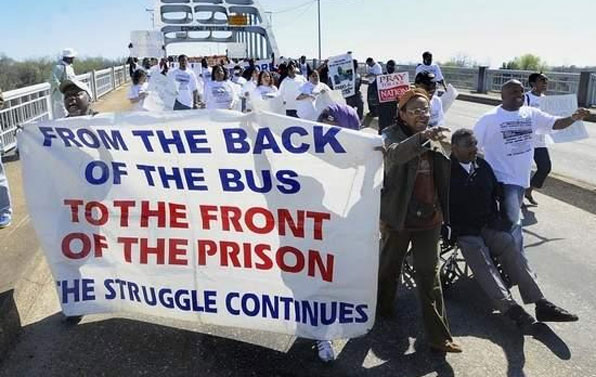
Jobs, Not Jails!
Saturday, Jan. 14, 2012 at 11 a.m
7th & P St. NW, Washington, D.C.
(Green/Yellow
Line to Mt. Pleasant-Convention Center)
Part of a Nationally Coordinated Day of Local Actions
The United States, with 2 million people locked behind bars, holds 25 percent of the world’s prisoners despite having only 5 percent of the world’s population. This is by far the world's largest population of incarcerated persons, with the next closest country on the list having nearly one million fewer people in prison. Despite representing roughly 13 percent of the U.S. population, African Americans account for over 35 percent of those in prison. A Black boy born in 2001 has a one-in-three chance of going to prison, while his white counterpart has a one-in-17 chance.
Under the pretext of the so-called “War on Drugs,” the mass incarceration epidemic has been disproportionately aimed at poor and working-class people, particularly Black communities. Prison statistics show that being sent to prison once makes one more likely to be sent to prison again. If and when they make it out, former prisoners have few opportunities and reduced rights as felons. The sum total of the massive expansion in prisons is that they simply beget more prisoners.
We are calling on people throughout the country to stand up on Jan. 14, 2012, against the brutal, profit-driven prison-industrial complex. In Washington D.C., we will be holding a march and rally against mass incarceration and we are asking you to join us with events in your city. On Martin Luther King weekend 2012, we want to raise the voices of thousands of people around the country voicing these demands:
End the Drug War Now
The chief instrument of mass incarceration is the so-called “War on Drugs.” Out of the roughly 2 million individuals currently incarcerated, roughly a quarter of them are convicted of drug offenses. Nearly 51 percent of those in federal prison in 2009 were there for drug related offenses. About 67 percent of felony drug arrests result in a prison sentence. Black defendants are 10.1 times more likely to be sentenced to prison for drug-related offenses. On the state level, over 44 percent of those convicted of drug crimes are Black, compared to about 27 percent white. The criminalization of drugs has put tens of thousands behind bars. This must end now!
Release All Non-Violent Drug Offenders
More than 21 percent of those incarcerated in the United States are there for non-violent drug offenses. Many non-violent offenders are addicts who are criminalized rather than treated for their addiction. Others are imprisoned for engaging in recreational behaviors that are no more dangerous than the legal ingestion of alcohol or nicotine. We want the release of non-violent drug offenders as well as provisions to make treatment available for those suffering from substance abuse.
End Exploitation of Prisoners' Families
In states across the country, the families of prisoners are hit with punitive measures despite having committed no crime. One common example is the exploitative pricing of collect calls from prison. Prior to recent reforms, families of prisoners in New York State were charged 630 percent above normal consumer rates for collect calls, and similar conditions exist in states across the country. On top of that, states collect large “kickbacks” from telephone service providers running into millions of dollars per year. We demand an end to usurious fees on phone calls, transferring money into prisoners' accounts, and all other charges and fees that impose a punitive financial burden on prisoners and their families.
End Inhumane Living Conditions in Prisons
The recent hunger strikes by California prisoners brought attention to the 513 prisoners who had spent a decade or more in Pelican Bay’s solitary confinement units. The number of prisoners subjected to prolonged isolation has rapidly increased along with the fast proliferation of “supermax” prisons around the country. Trapping prisoners in tiny cells for 20 to 24 hours a day, long-term isolation is widely considered akin to torture. As one report put it, prolonged isolation can cause “anxiety, depression, anger, cognitive disturbances, perceptual distortions, obsessive thoughts, paranoia, and psychosis.” We demand an immediate end to isolation policies and long-term solitary confinement.
Inhumane living conditions also include the denial of educational and vocational opportunities for prisoners, and the lack of adequate nutrition. We demand prisons cease using control over food as a punitive weapon, and provide fully nutritious meals. We additionally demand that all prison laborers be paid at the living wage for their home localities.
Jobs, Not Jails!
Meaningful employment must be provided to prisoners returning to society. The economy would have to create 18 million new jobs just to return to the same rate of employment that existed in 2000. This underscores the massive scale of the employment crisis for society as a whole, not to mention the extra restrictions and hurdles before former prisoners. As such, we demand jobs for all with special protections against the abuse of formerly incarcerated individuals.
Endorsed by: ANSWER Coalition; Ceasefire: Don’t Smoke the Brothers and Sisters; Political Education and Action Committee-Howard University; New Jim Crow Movement; Party for Socialism and Liberation (list still in formation)
For More Information: [email protected]
